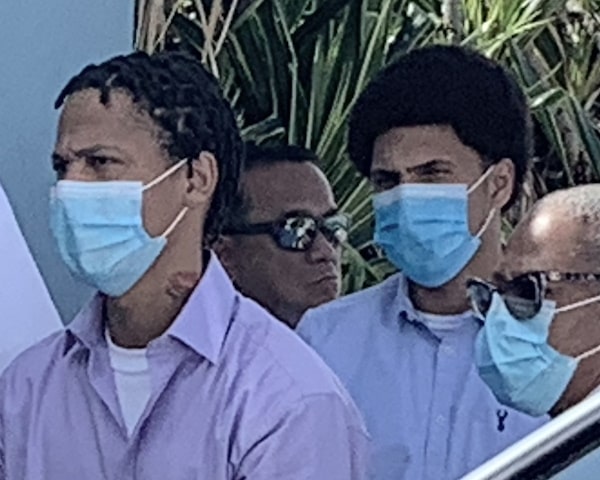‘God’ told mother to kill her child
(CNS): Local psychiatrist Dr Marc Lockhart, giving evidence in the murder trial of Tamara Butler, said that the defendant believed the voices in her head telling her to kill her six-year-old daughter because she was a demon came from God. Giving the court an account of his assessment of Butler last week, Dr Lockhart said he had diagnosed her with schizophrenia, the symptoms of which are hearing voices and command hallucinations.
“It is my opinion, with a reasonable degree of medical certainty, that Mrs Tamara Butler, at the time of the murder of Bethany Butler on October 27th, was suffering from such an abnormality of mind as to substantially impair her mental functioning and behaviour so that she was incapable of determining that what she was doing was wrong,” he said.
Explaining how he came to his conclusion, Dr Lockhart said that after many interviews with Butler, she had said that God told her that her daughter was a demon and that she should kill her. In the days leading up to the murder there were many signs that correlated with his diagnosis, he said and gave examples of reports from her husband: Lenford Butler had found her staring into the mirror for long periods of time, staring at the ceiling, not wanting to go to school, talking to herself and acting bizarrely.
In interviews with the psychiatrist, she had told him that she would hear voices telling her to do abnormal things. She would also talk about her daughter in the present tense, which Lockhart said showed that she was disconnected from reality.
He said that her cultural religious background combined with the diagnosis of schizophrenia identity disorder led her to believe the voices in her head were truly the voice of God. Dr Lockhart said he concluded that she had genuinely loved her daughter and struggled with the commands of the voices, which she believed to be God. He pointed to her strong religious upbringing, where God was a superior authority, and said it would be difficult for her not to obey a command to kill, even if it was her own child.
The court has heard that on the night of the murder, just before Lenford Butler, a police officer, was leaving for work, Butler shaved her head and eyebrows and told her husband she was also going to shave their daughter Bethany’s head. Sergeant Butler told her she was a crazy woman and before leaving the home had locked Bethany in a room with a cell phone to call him if she needed him.
But later that night, Tamara Butler broke through the door, got Bethany, shaved her head, stabbed her over 60 times and used rubbing alcohol to set the body alight. She then drove from the family’s home to East End, along the Queen’s Highway, where the police found her and the child’s body.
Dr Lockhart, who was called by the defence, told the court he did not find any evidence of drug abuse or dependency and there was no evidence of premeditation for the killing, and this supported his diagnosis.
The defence also called Dr Frank Knight, a psychiatrist from Jamaica, who agreed with Dr Lockhart’s report after interviewing Butler.
However, a third psychiatrist called to give evidence on behalf of the prosecution disagreed. Dr Wade Myers, a psychiatrist from the US, told the court he did not believe that Butler was suffering from such an abnormality of the mind that would have substantially impaired her mental responsibility for her acts when she killed the child. The prosecution alleges that she believed her husband was having an affair and she committed the murder as an act of revenge by taking away the most important thing to him.
Dr Myers accused Butler of “malingering” to get off the criminal responsibility of murder. Malingering is defined as fabricating or exaggerating the symptoms of mental or physical disorders for a variety of secondary gains motives, which may include getting lighter criminal sentences or simply to attract attention or sympathy.
When giving evidence, Dr Myers told the court that he diagnosed Butler with paranoia personality disorder and that she also showed signs of narcissism. Butler had told him that she was a trophy wife and she believed she came from a better class than her husband. She did not have a great circle of friends and did not trust many people and stayed to herself. Dr Myers said her actions were driven by the extreme rejection of her husband along with the years of adultery, and that Tamara Butler was jealous of the special bond between Bethany and her father.
Myers disagreed with Dr Lockhart’s diagnosis because he said the signs of schizophrenia would have been easily noticeable long before the murder and even after, but he claimed to have seen no reports to suggest those signs.
In his testimony Dr Lockhart had suggested that the reason why there were no such reports was because of the serious stigma that comes with having a mental disorder in a small jurisdiction like the Cayman Islands and she would not have talked to anyone about it for that reason.
The defence questioned the legitimacy of Dr Myers because he only met with Butler for a total of 7 hours some 11 months after the murder, whereas Dr Lockhart had met with her for 17 days just after the tragic killing. The defence also highlighted the fact Dr Lockhart saw over 30 patients a week, hundreds every year, while Dr Myers did not have patients but acted more as teacher of psychiatry.
The case continues Monday.



































